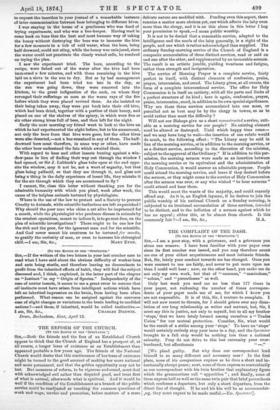THE COMPLAINT OF THE DASH.
[TO THE EDITOR OF THE "SPECTATOR:] SIR,—I am a poor stop, with a grievance, and a grievance you alone can remove. I have been familiar with your paper ever since its first number was issued, and you may therefore count we one of your oldest acquaintances and most intimate friends. But, Sir, lately your conduct towards me has changed. Once you were content to use me fairly, and never to put more upon me than I could well bear ; now, on the other hand, you make me do not only my own work, but that of "commas," "semicolons," "colons," and " parentheses " as well.
Only last week you used me no less than 177 times in your paper, not reckoning the number of times correspon- dents of your paper made use of me, for which I know yon are not responsible. It is of this, Sir, I venture to complain. I will not now resort to threats, for I should grieve over any disso- lution of our long relationship as writer and servant, but, Sir, I must say this in justice, not only to myself, but to all my brother 'stops,' that we have lately formed among ourselves a " Trades Union" for our mutual protection. Consider, Sir, what would be the result of a strike among your stops.' To have no ' stops would certainly entirely stop your issue in a day, and the Spectator brought to a full stop would be nothing less than a national calamity. Pray do not drive to this last extremity your over- burdened, but affectionate [We plead guilty. But why does our correspondent lend himself to so many different and necessary uses ? In the first place, none of his companions express as he does a short and in- tentionally abrupt pause; next, none of them express so conveniently as our correspondent with his twin brother that explanatory figure which the grammarians call " apposition " ; and finally, none of them express half so well as the same twin pair that brief parenthesis which confesses a departure, but only a short departure, from the direct line of thought. If he and his kin will be so accommodat- ng, they must expect to be made useful.—En. Spectator].


































 Previous page
Previous page